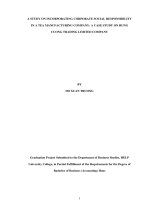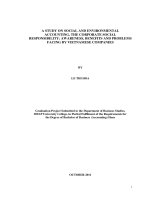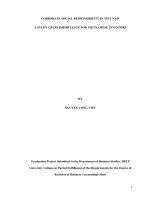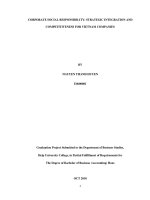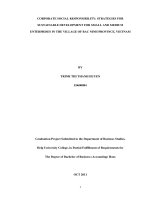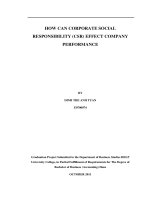final assignment corporate social responsibility
Bạn đang xem bản rút gọn của tài liệu. Xem và tải ngay bản đầy đủ của tài liệu tại đây (2.36 MB, 22 trang )
<span class="text_page_counter">Trang 1</span><div class="page_container" data-page="1">
<b>VIETNAM NATIONAL UNIVERSITY, HANOIVNU UNIVERSITY OF ECONOMICS & BUSINESS</b>
</div><span class="text_page_counter">Trang 2</span><div class="page_container" data-page="2"><b>Executive Summary</b>
In today's dynamic business landscape, Corporate Social Responsibility (CSR) is no longer a fringe concept, but a strategic imperative. In Vietnam, a nation experiencing rapid economic growth, is at a crucial juncture in its CSR journey. While awareness of CSR is growing, significant challenges remain. The dedication to sustainability displayed by Cocoon suggests a high likelihood of rigorous compliance with its practices. Cocoon's success demonstrates the immense potential of CSR in Vietnam.
This report explores the evolving landscape of CSR in Vietnam, examining its link to national development goals and its practical implementation through the lens of Cocoon, a leading Vietnamese cosmetics brand. By analyzing Cocoon's CSR strategy and practices, highlighting its strengths and areas for improvement. Since many factors must be considered for the research to be carried out successfully and the study has identified several topics that require more in-depth investigation. It was crucial to go into great detail about Cocoon’s CSR strategy and discuss how to improve their practices, address these challenges to communicate their impact effectively to be a beacon for responsible business in Vietnam and beyond.
</div><span class="text_page_counter">Trang 3</span><div class="page_container" data-page="3"><b>TABLE OF CONTENTS</b>
<b><small>1.1. CSR Landscape in Vietnam4 1.2. Official guidelines or regulations on CSR for enterprises4 1.3. Cocoon’s CSR Strategy and Practice6 </small></b>
<b><small>4.1. Solutions for Cocoon’s CSR implementation18 4.2. Promoting CSR’s Activities in Relation to Policy Compliance19 </small></b>
</div><span class="text_page_counter">Trang 4</span><div class="page_container" data-page="4"><b>1.1. CSR Landscape in Vietnam </b>
Although CSR has grown in popularity, it is still not used extensively. CSR has not yet become a norm, and only exists in big corporations with international strategy and clients.
A study by the Asian Kanen Institute claims that a small percentage of enterprises report on CSR, which is also the primary cause of the rise in CSR infractions by Vietnamese companies. The summary table shows that companies have merely increased public awareness of corporate social responsibility (CSR); actual implementation and application of CSR are still very low and have not received much attention. There is a deficiency here that must be fixed.
Priority level of CSR-related issues Source: Asian Kanen Institute
<b>1.2. Official guidelines or regulations on CSR for enterprises</b>
The impetus to apply CSR has grown in recent years. To promote economic growth and global integration, the nation has implemented a number of laws
</div><span class="text_page_counter">Trang 5</span><div class="page_container" data-page="5">topics are covered by these legal documents, including consumer rights protection, sustainable development, community involvement, employee-employer interactions, and environmental protection.
<b>• National Policies and Regulations:</b>
<b>National Strategy on Green Growth 2011-2020 (revised to </b>
2030): Promotes sustainable development and incorporates CSR principles into business practices.
<b>Law on Enterprises 2020: Includes provisions on environmental </b>
protection, labor rights, and social responsibility, encouraging responsible corporate behavior.
<b>Decree 69/2015/ND-CP on Corporate Social Responsibility Reporting: Mandates CSR reporting for listed companies and </b>
businesses exceeding specific turnover thresholds.
<b>Circular 07/2018/TT-BTNMT on Guidelines for Corporate Social Responsibility Reporting: Provides detailed guidance on </b>
the content and format of CSR reports.
<b>Other sectoral regulations: Ministries of Environment, Labor, </b>
Industry and Trade, etc., issue regulations that incorporate CSR aspects related to their specific fields.
<b>• Government Programs and Initiatives:</b>
</div><span class="text_page_counter">Trang 6</span><div class="page_container" data-page="6">Vietnam Business Social Responsibility (VBSR) Program: Promotes CSR best practices and provides capacity building support for businesses.
<b>National Corporate Governance Award: Recognizes companies </b>
with outstanding corporate governance practices, including CSR initiatives.
<b>Green Bond Issuance Program: Encourages businesses to raise </b>
capital for environmental and social projects.
<b>1.3. Cocoon’s CSR Strategy and Practice1.3.1. Overview of Cocoon</b>
<b>About Cocoon: Founded in Vietnam, Cocoon is a natural beauty brand </b>
that prioritizes sustainable and gentle skincare. Cocoon is honored to be the first Vietnamese cosmetic brand to be approved in the Leaping Bunny program committing to not testing on animals from the animal rights organization PETA.
</div><span class="text_page_counter">Trang 7</span><div class="page_container" data-page="7"><b>Core Values:</b> Cocoon embraces <b>natural beauty, sustainability, and inclusivity. </b>
<b>Mission Statement: Cocoon's mission is to "create sustainable, natural </b>
beauty products that are accessible to all and bring out the radiant
<b>Eco-friendly packaging and recycling: Minimizing waste and </b>
promoting responsible disposal.
<b>Carbon offsetting: Taking responsibility for unavoidable emissions.• Community Engagement:</b>
<b>Empowering local communities: Through sustainable farming and </b>
income generation initiatives.
<b>Raising awareness: About environmental issues and sustainable living.• Ethical Practices:</b>
<b>Cruelty-free commitment: Never testing on animals.</b>
</div><span class="text_page_counter">Trang 8</span><div class="page_container" data-page="8"><b>Fair trade practices: Ensuring fair wages and working conditions </b>
throughout the supply chain.
<b>Transparency: Building trust with customers through open </b>
communication about ingredients, sourcing, and manufacturing.
<b>b. Cocoon's CSR Engagement Strategies• Employees:</b>
<b>Internal training and workshops: Educating employees about </b>
Cocoon's CSR values, goals, and initiatives.
<b>Volunteer opportunities: Providing employees with chances to </b>
participate in community projects and environmental activities.
<b>Sustainability incentives: </b> Rewarding employees for demonstrating sustainable practices in their work and lifestyle.
<b>Employee well-being programs: Promoting health and wellness </b>
initiatives that align with Cocoon's commitment to social responsibility.
<b>• Suppliers:</b>
<b>Fair trade partnerships: Collaborating with suppliers who adhere </b>
to fair trade principles and ensure ethical labor practices.
<b>Sustainability audits and guidelines: Conducting regular audits </b>
to assess suppliers' environmental and social practices, providing clear guidelines for sustainable sourcing.
</div><span class="text_page_counter">Trang 9</span><div class="page_container" data-page="9"><b>Joint innovation and collaboration: Working with suppliers to </b>
develop sustainable packaging solutions, reduce waste, and optimize resource utilization.
<b>Transparency and communication: Maintaining open </b>
communication and sharing best practices with suppliers to uphold Cocoon's CSR values throughout the supply chain.
<b>• Local Communities:</b>
<b>Community education and awareness programs: Organizing </b>
workshops on environmental protection, sustainable agriculture, and responsible consumption.
<b>Supporting local economic development: Partnering with </b>
community cooperatives and initiatives to create income opportunities and empower local businesses.
<b>Investing in social infrastructure: Contributing to projects that </b>
improve access to education, healthcare, and sanitation facilities in local communities.
<b>Cultural exchange and engagement: Participating in local events </b>
and festivals, showcasing respect for and appreciation of cultural heritage.
<b>• Consumers:</b>
</div><span class="text_page_counter">Trang 10</span><div class="page_container" data-page="10"><b>Clear and transparent communication: Providing detailed </b>
information about Cocoon's CSR efforts, ingredients, and manufacturing processes on their website, packaging, and marketing materials.
<b>Educational content and campaigns: Launching awareness </b>
campaigns about sustainability, ethical practices, and the impact of consumer choices.
<b>Interactive platforms and storytelling: Engaging consumers </b>
through social media, online contests, and customer feedback channels to gather insights and foster dialogue.
<b>c. Cocoon’s CSR Practices• Local Sourcing Partnership:</b>
Cocoon partners with a cooperative of female farmers in the Mekong Delta who cultivate organic coconuts using traditional methods. They provide the farmers with fair trade prices, training in sustainable agriculture practices, and access to microloans to expand their farms. This initiative not only secures a reliable source of high-quality ingredients for Cocoon but also empowers local women and improves their livelihoods.
</div><span class="text_page_counter">Trang 11</span><div class="page_container" data-page="11"><b>• Eco-Friendly Packaging:</b>
Cocoon switched from using plastic bottles to packaging their products in recycled glass bottles that are reusable and recyclable. They worked with local glass manufacturers to develop a lightweight and durable bottle design that minimizes waste and carbon footprint. In-store recycling bins and educational materials encourage customers to return their used bottles, closing the loop on the packaging lifecycle.
<b>• Community Education Workshop:</b>
Cocoon organizes workshops in rural communities to educate locals about the importance of environmental protection and sustainable living. They teach participants about composting, waste reduction, and planting trees. These workshops empower communities to take ownership of their environment and make sustainable choices in their daily lives.
<b>• Cruelty-Free Certification:</b>
Cocoon obtained Leaping Bunny certification, ensuring all their products are cruelty-free and never tested on animals. They actively promote cruelty-free practices in the beauty industry by partnering with animal welfare organizations and raising awareness among consumers. This commitment showcases Cocoon's ethical values and resonates with their target audience who demand transparency and ethical practices.
</div><span class="text_page_counter">Trang 12</span><div class="page_container" data-page="12"><b>• Carbon Offset Program:</b>
Cocoon partners with a local reforestation project to plant trees for every product they sell. They have planted thousands of trees in degraded areas, contributing to carbon sequestration and restoring biodiversity. This initiative allows Cocoon to offset their carbon emissions while making a tangible impact on the environment.
<b>• Other CSR activities/CSR related campaign:Reducing waste</b>
Cocoon have collected 10,085 used bottles so far, as part of ongoing efforts to reduce waste and minimize our impact on the environment. By
packaging, Cocoon helps to conserve resources, reduce the amount of waste that ends up in landfills, and support a more sustainable future.
</div><span class="text_page_counter">Trang 13</span><div class="page_container" data-page="13"><b>Protecting Wild Animals & the Ocean</b>
<b>Supporting a Greener Future</b>
Cocoon has organized over 50 points to collect used batteries, as part of ongoing efforts to save the environment. By collecting and properly disposing of used batteries, Cocoon is reducing the risk of toxic chemicals leaching into the soil and groundwater, and helping to protect the planet for future generations.
<b>2.1. Strengths of Cocoon's CSR Strategy• Holistic Approach:</b>
<b>Addresses environmental, social, and ethical aspects: This </b>
demonstrates a deep commitment to responsible business practices and creates a well-rounded impact.
</div><span class="text_page_counter">Trang 14</span><div class="page_container" data-page="14"><b>Local focus: Minimizes carbon footprint, supports Vietnamese </b>
farmers, and empowers communities through local sourcing and community engagement initiatives.
<b>Transparency: Builds trust with customers by openly </b>
communicating about ingredients, sourcing, and manufacturing processes.
<b>Ethical practices: Aligns with consumer values through </b>
cruelty-free and fair trade commitments.
<b>• Impactful Initiatives:</b>
<b>Practical and real-world: Initiatives like partnerships with </b>
women's groups, eco-friendly packaging, and community workshops show tangible commitment and effectiveness.
<b>Scalable and adaptable: Programs can be expanded to reach more </b>
communities and adjusted to address new challenges and opportunities.
<b>Data-driven: Cocoon's efforts to invest in impact measurement </b>
and quantifying the outcomes of their initiatives strengthens their claims and showcases their contribution to positive change.
<b>• Strategic Partnerships:</b>
<b>Collaboration with like-minded organizations: Amplifies </b>
Cocoon's reach and impact by leveraging expertise and resources.
</div><span class="text_page_counter">Trang 15</span><div class="page_container" data-page="15"><b>Supports existing social movements: Aligning with initiatives </b>
like animal welfare and sustainable agriculture strengthens their CSR narrative and aligns with broader societal goals.
<b>Elevates Vietnam's sustainable beauty image: Cocoon's success </b>
becomes a beacon for other Vietnamese enterprises, contributing to positive industry-wide change.
<b>• Strong Brand Differentiation:</b>
<b>Stands out in the Vietnamese market: Combines natural </b>
ingredients, affordability, and environmental consciousness, appealing to a specific and growing consumer segment.
<b>Authentic and relatable: Focus on Vietnamese heritage and local </b>
partnerships resonates with consumers seeking cultural connections and ethical practices.
<b>Positive brand image: Cocoon's commitment to CSR attracts </b>
attention and builds trust, leading to customer loyalty and favorable brand perception.
<b>2.2. Challenges:</b>
<b>• Adapting to Evolving Consumer Expectations: </b>
Consumer expectations for sustainability and ethical practices are constantly evolving. Cocoon needs to stay ahead of the curve by innovating and launching new initiatives that address emerging concerns. Balancing consumer demand for affordable beauty products with their commitment to fair trade practices and
</div><span class="text_page_counter">Trang 16</span><div class="page_container" data-page="16">higher-quality ingredients can be challenging, requiring creative solutions and clear communication.
<b>• Consumer Awareness and Education:</b>
The vegan cosmetics market is currently smaller than the conventional market, limiting the potential customer base for Cocoon. Educating consumers about the benefits of vegan cosmetics and the brand’s commitment to cruelty-free and sustainable practices can be a hurdle in a market where such concepts might be relatively new.
<b>• Measuring and Communicating Impact</b>
Quantifying the carbon footprint reduction from local sourcing compared to non-local sourcing requires extensive data collection and analysis, posing a resource-intensive challenge. Measuring the long-term impact of community education workshops on environmental practices in villages might require years of tracking behavior changes and environmental indicators, making immediate impact assessment difficult.
</div><span class="text_page_counter">Trang 17</span><div class="page_container" data-page="17">Cocoon's CSR strategy is not just a marketing tagline; it's the intricate tapestry woven into the very fabric of their business identity. By prioritizing sustainable sourcing, ethical production, and community engagement By actively . engaging with local communities, supporting education, and preserving cultural heritage, Cocoon transcends mere philanthropy, fostering genuine partnerships and shared growth.
However, Cocoon's journey is not without challenges. Balancing ethical sourcing with competitive pricing, educating consumers, and navigating the complexities of a market require constant innovation and dedication. Yet, they remain committed to pushing boundaries, exploring new solutions, and advocating for responsible CSR practices across the industry.
</div>